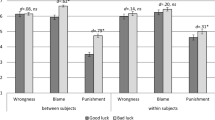Abstract
Gideon Yaffe is to be commended for beginning his exhaustive treatment by asking a surprisingly difficult question: Why punish attempts at all? He addresses this inquiry in the context of defending (what he calls) the transfer principle: “If a particular form of conduct is legitimately criminalized, then the attempt to engage in that form of conduct is also legitimately criminalized.” I begin by expressing a few reservations about the transfer principle itself. But my main point is that we are justified in punishing attempts only when and for a different reason than Yaffe provides. I argue that attempts are legitimately punished only when they raise the risk that a harm will actually occur. To overcome the problems my explanation encounters with factually impossible attempts, I suggest an account of risk that relies on ordinary language and possible worlds.
Similar content being viewed by others
Notes
Existing law on double inchoate liability is obscure, inconsistent, and unprincipled. For an attempt to rationalize this area of the law, see Law Commission: Conspiracy and Attempts: Consultation Paper No. 183. http://books.google.com/books?id=ao8S9YBcPogC&pg=PA109&lpg=PA109&dq=%22double+inchoate+liability%22&source=bl&ots=BEDY8pbQlg&sig=FPAedb7owD3IVJpXl9PCaO-H2DI&hl=en&ei=DJhmTY7qEcH58Abx_bXsCw&sa=X&oi=book_result&ct=result&resnum=1&ved=0CBMQ6AEwAA#v=onepage&q=%22double%20inchoate%20liability%22&f=false, Part 7.
New Jersey Criminal Code 2C:35-11(3). The legislature is not too worried that drug buyers will be duped. Instead, the point is to prevent unsavory characters from distributing what they know is not a drug to buyers they know to be undercover policemen and thus to avoid liability when the lab reveals that the substance is not illicit.
Let me illustrate this problem by a new offense we might decide to add to our penal code. Consider a promising proposal to identify the culpability of a defendant who commits a crime under the influence of intoxicants. Rebecca Williams argues that the least objectionable solution to this nearly intractable difficulty is to enact a new offense of “committing [the actus reus of offence X] while intoxicated.” Suppose her proposal is adopted. Should we uncritically suppose that this new offense should (via the transfer principle) justify the enactment of an offense of “attempting to commit [the actus reus of offence X] while intoxicated?” Although it would be coherent to enact this latter offense, the intuitive case for so doing seems weak. Williams herself believes that her new offense would be “so far removed from the full offence” that attempt liability should be resisted. My point is that we should not automatically assume that an offense, even if legitimate, should allow for attempt liability. (Williams forthcoming).
§230.1(2).
The only reason this statement is an exaggeration is because the result to be prevented is not an explicit element of the statute at all. In deleting this element, states reduce the impact of the presumption of innocence (Ashworth 2006).
Actually, Yaffe produces two arguments in favor of the transfer principle, the second of which appears on p. 31ff. I do not discuss this second argument, partly because, on its own terms, it purports to identify (at p. 33) “the commonality between legitimately sanctioned completions and some attempts” (italics added).
Whether such a case actually exists depends in part on what is to be regarded as a type of activity.
If Yaffe is correct that defendants who perpetrate inherently impossible attempts may have committed an attempt without being guilty of an attempt, it is hard to see how he could favor mitigation to an outright acquittal.
MPC Sec. 5.05(2).
I also question Yaffe’s rationale for requiring an act before a defendant can be liable for an attempt. In many cases we possess reliable evidence that a defendant is committing an attempt notwithstanding the fact that he has failed to act.
I will not comment on the apparent oddity of describing Yaffe’s (2011, p. 110n1) solution as convoluted when he charitably credits me for developing the distinction between guilt and commission on which his solution rests.
References
Alexander, L. (1993). Inculpatory and exculpatory mistakes and the fact/law distinction: An essay in memory of Myke Balyes. Law and Philosophy, 12, 33.
Alexander, L., Ferzan, K., & Morse, S. (2009). Crime and culpability. Cambridge: Cambridge University Press.
Ashworth, A. (2006). Four threats to the presumption of innocence. South African Law Journal, 123, 63.
Chiao, V. (2009). Intention and attempt in criminal law. Criminal Law and Philosophy, 4, 37.
Chisea, L. E. (2008). Why is it a crime to stomp on a goldfish?—Harm, victimhood and the structure of anti-cruelty offenses. Mississippi Law Journal, 78, 1.
Crocker, L. (1992). Justice in criminal liability: Decriminalizing harmless attempts. Ohio State Law Journal, 53, 57.
Feinberg, J. (1984). Harm to others. New York: Oxford University Press.
Gardner, J., & Shute, S. (2000). The wrongness of rape. In J. Horder (Ed.), Oxford essays in jurisprudence (4th series).
Garvey, S. P. (2011). Are attempts like treason? New Criminal Law Review, 14, 173.
Husak, D. (2008). Overcriminalization. New York: Oxford University Press.
Husak, D. (2010). Repaying the scholar’s compliment. Jerusalem Review of Legal Studies, 1, 48.
Kaplan, M. (2012). Restoring reason to HIV-exposure laws. Indiana University Law Review.
Mele, A. (2012). (this volume).
Moore, M. (1997). Placing blame. Oxford: Clarendon Press.
Robbins, I. P. (1989). Double inchoate crimes. Harvard Journal on Legislation, 26, 1.
Schaffer, J. (2010). Contrastive causation in the law. Legal Theory, 16, 259.
Westen, P. (2008). Impossible attempts: A speculative thesis. Ohio State Journal of Criminal Law, 5, 523.
Williams, G. (1983). The problem of reckless attempts. Criminal Law Review, 365.
Williams, R. (Forthcoming). Voluntary intoxication—A lost cause?.
Yaffe, G. (2011). Attempts. New York: Oxford University Press.
Author information
Authors and Affiliations
Corresponding author
Rights and permissions
About this article
Cite this article
Husak, D. Why Punish Attempts at All? Yaffe on ‘The Transfer Principle’. Criminal Law, Philosophy 6, 399–410 (2012). https://doi.org/10.1007/s11572-012-9147-z
Published:
Issue Date:
DOI: https://doi.org/10.1007/s11572-012-9147-z




